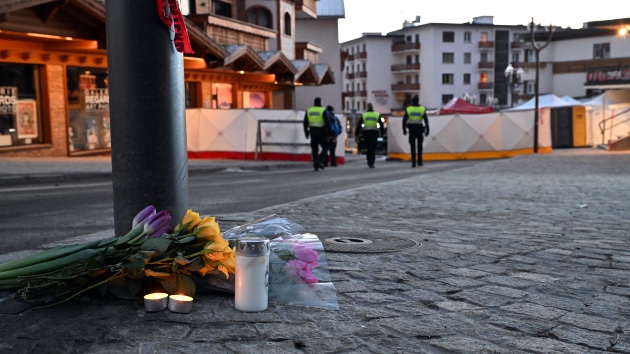‘Catastrophic’: Residents, aid organizations describe conditions in northern Gaza
Written by ABC Audio ALL RIGHTS RESERVED on January 14, 2024

While the Israeli army has gradually reduced the number of troops it has in northern Gaza, many residents and relief organizations said that part of the region had been largely isolated from humanitarian aid and is in dire need of help.
“People are absolutely desperate,” United Nations Relief and Works Agency Director of Communications Juliette Touma told ABC News. “Very, very little has been allowed to reach the north.”
The Israeli army has gradually drawn down its troops from northern Gaza after it announced last weekend it had “dismantled” Hamas’ military framework there. “Now, we are focusing on dismantling Hamas in the central and southern Gaza Strip,” Israel Defense Forces spokesman Col. Daniel Hagari said in a briefing last week.
As the Israelis reduce their presence, aid agencies said they are pressing for better access to provide food and fuel for the thousands of people that remain in the north, largely cut off from the rest of Gaza.
ABC News has received detailed accounts of what life was like under Israeli siege in northern Gaza, with many residents telling us they received no aid for at least 50 days and were completely cut off.
“We had nothing left to eat,” Rafiq Hajo, a 69-year-old from the Sheikh Radwan neighborhood north of Gaza City, told ABC News. “My children went out to look for food, but the area did not have any market to buy anything. We were forced to take some canned goods and what we needed from supermarkets that were bombed.”
Food in UNRWA shelters in northern Gaza is “very, very limited,” according to Touma. “We’ve passed the stage of being concerned. We are alarmed.”
Since the start of the war, only a dozen UNRWA trucks have been able to make it to the north. Each time they arrive, they are swarmed by people, Touma said.
“They stop the trucks; they take the stuff. They don’t wait for distribution,” Touma said, adding that, “The highest levels of hunger and in fact starvation are in the north of Gaza.”
According to a December report by the United Nations into food insecurity in Gaza, “At least one in four households (more than half a million people) in the Gaza Strip are facing catastrophic acute food insecurity conditions (IPC Phase 5 – Catastrophe), characterized by extreme food gaps and collapse of their livelihood.”
The International Food Security Phase Classification (IPC) is an international framework used to assess food insecurity and malnutrition. The IPC contains five phases of hunger crisis, ranging from phase 1 (minimal/none) to phase 5 (catastrophe/famine).
The situation is the worst in northern Gaza where “45% of households will be experiencing IPC Phase 4 (Emergency) levels of acute food insecurity and 30% of households will experience IPC Phase 5 (Catastrophe) levels of acute food insecurity,” the report said.
“In Gaza at this moment, literally the whole population is in crisis level of hunger or worse. And of those people, about 26%, meaning one-quarter of the population is literally starving. In number terms, we are talking about 577,000 people,” World Food Program’s Chief Economist Arif Husain told ABC News Friday.
“We are seeing a situation where there’s no food at all or very, very little, if any,” Maulid Wafa, senior emergency coordinator for UNICEF in Gaza, told ABC News Friday.
“The situation in Gaza could only be described as catastrophic. Extremely catastrophic,” he added.
The World Food Program paints an even bleaker picture. “If things continue as they are, or if things worsen, we are looking at a full-fledged famine within the next six months, ” Husain said.
Coordination of Government Activities in the Territories (COGAT), the Israeli authority in charge of coordinating aid to Gaza, maintains it is working with international organizations to get more aid into the strip and to the north in particular.
“This coordination covers movements in favor of delivery of supplies and responding to the needs of the Gaza Strip residents, including residents of the northern Gaza Strip,” it said in a statement Friday. “All this is done subject to the prevailing security situation, considerations related to safeguarding our troops and protecting the moving convoys, while maintaining control to prevent the supplies from falling into the hands of the Hamas terrorist organization.”
This area of the Gaza Strip has seen some of the fiercest fighting and heaviest bombardments, entire streets have been destroyed and for periods it was completely cut off – no internet, electricity, water or access from the rest of Gaza, residents said.
“The heavy bombing completely annihilated the area,” Yahya Al-Madhoun, a 57-year-old from Beit Lahia, told ABC News. “There was no contact or communication with the world, and we could not fend for ourselves,” he explained.
“Every day that passes is an escape from death for us,” Al-Madhoun said. “If we survive the bombing, we will not survive the hunger. If we survive the hunger, we will not escape execution or arrest.”
Al-Madhoun had opted to stay in northern Gaza despite the Israeli military telling residents of his neighborhood to flee to the safe zones in the south. In mid-October, the IDF opened humanitarian corridors for northern Gazans to flee to designated areas in the south.
“I am a member of the Beit Lahia camp committee, and I felt that I had to stay to help my family and neighbors,” Al-Madhoun said. “In the beginning, it was good. We had some food and we could make bread, but when the bombing intensified greatly, the northern areas were separated from Gaza City.”
He describes the very difficult situation those sheltering in UNRWA schools there had to face.
“For 50 days, no aid arrived in the northern region. Tanks were surrounding the schools and firing shells at the displaced people inside. We felt hungry for long days. If we found food for one day, we would not find it for three days,” Al Madhoun said. “I used to eat one piece of bread a day. We were trying not to die of hunger due to the severe siege and the cutting off of everything from us.”
He said the Israeli military eventually stormed the UNRWA school he was sheltering in.
“We were asked to take off our clothes. A large number of men were naked without clothes. This is a difficult feeling of humiliation,” Al-Madhoun said.
“They accused us of supporting the events of the 7th of October. It was terrifying when they executed a man in front of us, Nawaf Al-Zaanin, who was 63 years old,” Al-Madhoun told ABC News. “We were very afraid that they would execute us all. That was on the 9th of December. They put us in a hole for four hours with our hands tied and blood almost pouring out of them.”
The Israel Defence Forces told ABC News that “individuals detained are treated in accordance with international law.”
“It is often necessary for terror suspects to hand over their clothes such that their clothes can be searched and to ensure that they are not concealing explosive vests or other weaponry,” the IDF said after a request for comment on this incident.
“Clothes are not immediately returned to the detainees, due to the suspicion they may conceal means that can be used for hostile purposes [such as knives]. Detainees are given back their clothes when it’s possible to do so,” the IDF said.
When asked specifically about the death that Al Madhoun said he witnessed, they responded, “The IDF is not aware of the death of a 63-year-old man in the school.”
UNRWA estimates 300,000 people remained in northern Gaza while it was under siege. Among them was Hajo. He told ABC News he could not follow the Israeli instructions to walk south along a humanitarian corridor because he has a disabled daughter.
“I have a 20-year-old girl with disabilities, and she has special needs and I cannot move her anywhere,” Hajo said. “She has a special room, and we deal with her in a special way, and she is accustomed to her life at home.”
Instead, Hajo and his family stayed at home, enduring some harrowing moments, “When the tanks were at the door of the house, we were very afraid that the soldiers would hear our voice in the house and break into it. I agreed with my family that no sound would ever come out from us,” he told ABC News.
“During the two weeks, we could not move and we ran out of water and we felt very thirsty. We have a window opposite our neighbor Louay’s house. I was throwing a very small stone at him in a low voice and he understood that I needed something and threw me a bottle of water. I drank very little water, just enough to wet my mouth. We were hearing the sound of shelling and intense clashes between the Israeli soldiers and the Palestinian resistance. We were constantly praying that they would withdraw from the area without blowing up the houses. We were very afraid of the sounds,” he said.
“When the tanks withdrew, we felt free. We miraculously escaped death,” Hajo said.
Hamas terrorists launched a surprise attack on Israel on Oct. 7 that left more than 1,200 dead, 6,900 injured and more than 200 taken hostage, according to Israeli officials.
Israel responded with airstrikes and a ground operation in the Gaza Strip that has killed at least 23,357 people and wounded at least 59,410 others, according to the Hamas-run Gaza Ministry of Health.
Raghad Al-Salem, a 35-year-old mother from Gaza City, also told ABC News about her experience under siege.
“We were forced to enter people’s homes to search for food inside in order to escape death,” Al-Salem told ABC News. “I was sitting in a room with my children and my husband and we held each other tightly and prayed that the night would pass quickly so that the sound of the terrifying bombing would end.”
She said their family lost more than 60 people since the war began.
“We are trying to escape death by any means possible, but we do not know if we will succeed or not,” Al-Salem said. “What I hope is to die with my family. I don’t want to die and leave my three children and my husband, and I don’t want one of them to die and leave me. Either we all survive or we all die.”
Copyright © 2024, ABC Audio. All rights reserved.

 KVSP
KVSP 




